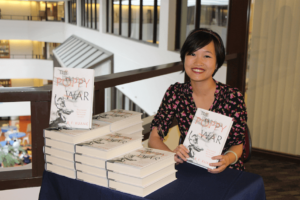by The Cowl Editor on August 30, 2018
Arts & Entertainment

by Sara Conway ’21
A&E Staff
On her website, author R.F. Kuang explains why she focused her debut novel, The Poppy War, on the 1937 Rape of Nanjing. Kuang writes, “The west has never done a good job of caring about sexual violence done to women who aren’t white,” and states that she would “like to depict the acts in bloody, brutal, stark detail.”
In fact, The Poppy War explores violent themes inspired by real events in 20th century China. Kuang compiled a list of content warnings found in her novel, including: self-harm, suicide, violent rape, sexual assault, murder, massacres, brutalization, mutilation, torture, substance abuse, abuse, emotional abuse, physical abuse, relationship abuse, human experimentation, chemical warfare, and genocide.
Literature on World War II often focuses heavily on Nazi Germany and the Holocaust; however, in her debut, Kuang sheds light on a little known, sickening story of the human cruelty that happened during World War II. The 1937 Rape of Nanjing occurred during the Sino-Japanese War after the city—then the capital of China—fell to Japanese forces.
Kuang points out in her article that some Japanese scholars still deny that the horrific event occurred. She argues that the Rape of Nanjing would never have become known to the Western world if not for the book published by Iris Chang.
The Poppy War follows a war orphan named Fang ‘Rin’ Runin who, after acing the Keju—a high stakes-exam that decides whether one is worthy of receiving further education—travels from her abusive home to the most elite military academy in the empire, Sinegard. Rin discovers that she possesses an aptitude for shamanism with the mentorship of the flightiest teacher at Sinegard.
Simultaneously, the Nikara Empire and its enemy across the sea, the Federation of Mugen, seem to be on the cusp of the Third Poppy War. Kuang creates a powerful and engaging story as she blends unexpected heroes, disappearing gods, and unknown histories.
Rin is not the average fierce heroine many readers love. Rin, rather, is a complex character who challenges the typical characteristics of a “hero.”
Kuang writes her as fiercely human; Rin wants power, and she will do anything to ensure that she will get it. She is flawed, but that is because she is a human being with human wants and an ambition that she strives to satisfy above all else.
In chapter 21, based on the Rape of Nanjing, Kuang weaves her words in such a manner that illuminates her brief, but provoking, descriptions. The destruction and treatment of human lives that Kuang writes is a horrifying, yet eye-opening, experience. Kuang illustrates the never-ending limits of human cruelty and the unspeakable ramifications when one stops noticing this kind of torture.
The Poppy War tells an unforgettable, absolutely necessary story that does not shy away from addressing the brutality of the past. Kuang concludes her explanation regarding The Poppy War by simply stating “silence hurts so much worse.”